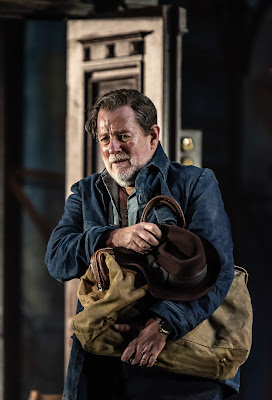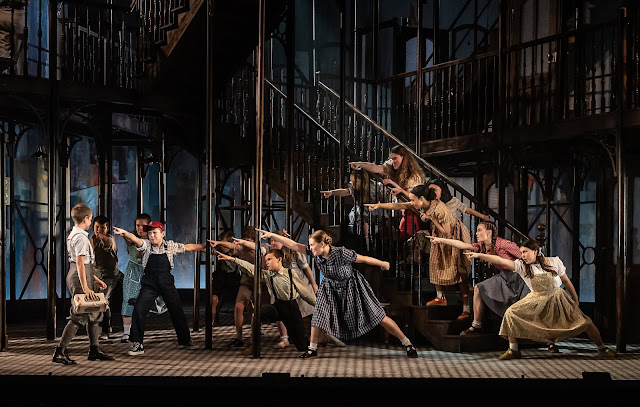 |
| Kurt Weill: Street Scene - Opera North (Photo Clive Barda) |
Reviewed by Robert Hugill on 25 January 2020 Star rating: (★★★★½)
A brilliant ensemble revival of Weill's Broadway opera which does justice to the work's stylistic diversity
 |
| Kurt Weill: Street Scene - Giselle Allen - Opera North (Photo Clive Barda) |
Matthew Eberhardt's production of Kurt Weill's Street Scene at Opera North (seen 25 January 2020 at the Grand Theatre, Leeds), conducted by James Holmes, embraces the work's diversity and multiplicity. Central to the performance is the ensemble of the Opera North chorus, providing over 20 of the named roles including Rose Maurrant (Gillene Butterfield) and Sam Kaplan (Alex Banfield). This ensured a terrific sense of community in the denizens of the tenement block. Rose's parents, Anna and Frank Maurrant were Giselle Allen and Robert Hayward(last seen here as Tosca and Scarpia), with Christopher Turner as Lippo Fiorentino, John Savournin as Carl Olsen, Byron Jackson as Henry Davis and Quirijn de Lang as Harry Easter. And alongside the opera singers, musical theatre trained Michelle Andrews and Rodney Vubya as Mae Jones and Dick McGann.
Opera North has form both with Kurt Weill and musical theatre, having performed other rare Weill including Love Life and One Touch of Venus, as well as the series of Sondheim musicals done in conjunction with the West Yorkshire Playhouse. So the blending of operatic and musical theatre traditions was beautifully done.
The designs were by Francis O'Connor, the set eschewed the traditional brownstone facade for a more flexible structure, a skeletal staircase and balconies which formed the building's central space, but could double as the outside. Costumes were firmly 1940 (Christopher Turner as Lippo Fiorentino was even a GI), the era when the opera debuted. Elmer Rice's original play (with a whopping 50 named roles) appeared in 1929.
 |
| Kurt Weill: Street Scene - Claire Pascoe, Byron Jackson, Amy J Payne, Richard Mosley-Evans, Miranda Bevin, John Savournin, Christopher Turner, Robert Hayward - Opera North (Photo Clive Barda) |
Here James Holmes and Matthew Eberhardt calculated things brilliantly, we never felt short-changed but each number slotted into the whole so that Act One fair bowled along as it should. It helped that Howard Hudson's lighting meant that the stage could be moved between moods in a simple yet imaginative manner.
 |
| Kurt Weill: Street Scene - Robert Hayward Opera North (Photo Clive Barda) |
Gillene Butterfield was wonderfully poised as Rose, she created a sense of Rose's 'don't touch me' perfection which you felt was her protection against the outside world. Only occasionally did it slip, in her duet with Sam (Alex Banfield) at the end of Act One and the moments when she hesitantly approached each of her parents attempting to suggest another way, a different behaviour. Then at the end, after the tragedy, as she announced to Sam she must go away, we sense she had no protection left. Alex Banfield made an unlikely romantic hero, nervy, intense and hesitant, the bookish trainee lawyer whose opening solo is a hymn to the unnerving quality of the house at night. But Banfield looked and sounded the part, whilst being able to belt out a number with the appropriate vocal quality, and his Sam had an appealing quality to which made you root for him.
Around these four swirled the other inhabitants of the house, and Matthew Eberhardt's clear direction ensured that we always knew who belonged to whom. Claire Pascoe, Miranda Bevin and Amy J Payne, as Emma Jones, Greta Fiorentino and Olga Olsen, formed the backdrop, a trio of gossiping fates always commenting on the goings-on and happy to criticise. Christopher Turner was an engaging Lippo Fiorentino, prime mover in the Ice Cream Sextet, Stuart Laing as Daniel Buchanan made the most of his solo as an expectant father, John Savournin provided firm support as Carl Olsen, Byron Jackson was the amiable janitor with his own catchy song 'I Got a Marble and a Star'. As Mae Jones and her beaux, Michelle Andrews and Rodney Vubya combined singing, jitterbugging and drama brilliantly in 'Moon Faced and Starry Eyed', whilst Quirijn de Lang gave a superb cameo as the sharp-suited Harry Easter who wants to put Rose on the stage (Lang is also the Count in Opera North's current revival of Mozart's The Marriage of Figaro). Amy Freston and Dean Robertson gave strongly etched accounts of Abraham and Shirley Kaplan, Sam's father and sister. Richard Mosely-Evans was the drunken George Jones, with Christopher Nairne as his slimy son Vincent.
 |
| Kurt Weill: Street Scene - Gillene Butterfield, Alex Banfield Opera North (Photo Clive Barda) |
Until the tragedy strikes we see nothing of the chorus, per se, focus is on the individual characters with a horde of children running around. Opera North fielded a superb cast of children, opening Act Two with a brilliantly incisive account of 'Catch Me if You Can'. The adult chorus coalesced as a back-drop to tragedy, commenting and providing another layer to the musical mix in Act Two.
There is no happy end to this story, Sam Kaplan is heart-broken, Rose Maurrant plans to take her brother Willy (the excellent Louis Parker) off to try and create a new life, Anna Maurrant and her lover Steve Sankey (Paul Gibson) are dead and Frank Maurrant is headed for the electric chair. But life in the tenement goes on, another family comes to view the Hildebrand's apartment, and our three fates (Claire Pascoe, Miranda Bevin and Amy J Payne) sing of the heat, just as at the opening.
Under James Holmes, the orchestra of Opera North moved effortlessly between styles. Kurt Weill might have written pure musical theatre numbers but his orchestral writing is symphonic, themes come back as the drama requires. The result here was brilliantly played and moulded by Holmes into a well-placed, coherent mix.
There was a sound design, from Gareth Tucker from Autograph Sound. The work's mix of dialogue, melodrama (in the strict musical sense), musical theatre and opera made it very necessary. This work largely unobtrusively, though for the numbers like the opening ensemble 'Ain't It Awful, the Heat?' balance favoured the orchestra making diction difficult. There were no surtitles but comprehensibility was high.
 |
| Kurt Weill: Street Scene - Oliver Wright as Charlie Hildebrand (far left), Louis Parker as Willie Maurrant (red cap) and children - Opera North (Photo Clive Barda) |
 |
| Kurt Weill: Street Scene - Gillene Butterfield, Quirijn de Lang Opera North (Photo Clive Barda) |
Anna Maurrant - Giselle Allen
Frank Maurrant - Robert Hayward
Rose Maurrant - Gillene Butterfield
Willie Maurrant - Louis Parker
Sam Kaplan - Alex Banfield
Abraham Kaplan - Dean Robinson
Shirley Kaplan - Amy Freston
Greta Fiorentino - Miranda Bevin
Lippo Fiorentino - Christopher Turner
Emma Jones - Claire Pascoe
George Jones - Richard Mosley-Evans
Mae Jones - Michelle Andrews
Vincent Jones - Christopher Nairne
Olga Olsen - Amy J Payne
Carl Olsen - John Savournin
Laura Hildebrand - Victoria Sharp
Charlie Hildebrand - Oliver Wright
Mary Hildebrand - Hazel Read
Jennie Hildebrand - Laura Kelly-McInroy
Henry Davis - Byron Jackson
Grace Davis - Sara Belal
Harry Easter - Quirijn de Lang
Dick McGann - Rodney Vubya
Daniel Buchanan - Stuart Laing
Steve Sankey - Paul Gibson
Nursemaids - Lorna James, Hazel Croft
Doctor - Jeremy Peaker
Police - Ivan Sharpe, Nicholas Butterfield, Tim Ochala-Greenough
Salvation Army - Kathryn Stevens, Rachel J Mosley
Violin Girl - Niamh Murphy
Grocery Boy - Benjamin O'Connor
Children - Charlotte Carr, Travis Claark, Henry Kent, Annabelle Lee, Blaize Middleton, Eve Midgely, Max Scholey, Keira Smallwood, Alexandra Wilkinson
Conductor - James Holmes
Director - Matthew Eberhardt
Set & Costume Designer Francis O’Connor
Lighting Designer - Howard Hudson
Choreographer - Gary Clarke
Elsewhere on this blog
- Audience development and evangelism at the core of what they do: I chat to Adam Szabo of the Manchester Collective - interview
- Maxim Vengerov: celebrating 40 years since his stage debut with new recordings & a new relationship with IDAGIO - interview
- Beethoven Odyssey: Daniel Barenboim completes his sonata performances at the Philharmonie in Paris (★★★★★) - concert review
- Beethoven marathon: François-Frédéric Guy directs all the piano concertos from the keyboard in one concert in Paris (★★★★★) - concert review
- A flaming affair: Berlioz' La damnation de Faust at the Philharmonie de Paris -
(★★★★★) concert review - From the rare to the popular: Fauré and Poulenc from Bertrand de Billy and the London Philharmonic (★★★★) - concert review
- Bach Round-Up: violin, piano, organ, recorder, viol, choral and orchestra by Bach and his cousin Johann Bernard - cd review
- European song exploration: Malcolm Martineau's Decades - A Century of Song reaches the 1840s (★★★★) - CD review
- An engaging Baroque recital from City Music Foundation artist, Anna Cavaliero - concert review
- Notable debut: the Armenian State Symphony orchestra's first Barbican appearance gave us music from Armenia alongside Bruch and Ravel with the orchestra's artist in residence, Maxim Vengerov (★★★★) - concert review
- An anarchic approach to the everyday: Bastard Assignments debut album (★★★½) - CD review
- Songs from the Soil: Theatre of Voices launches Kings Place's Nature Unwrapped season (★★★½) - concert review
- Home











Fauré and Poulenc from Bertrand de Billy
ReplyDelete